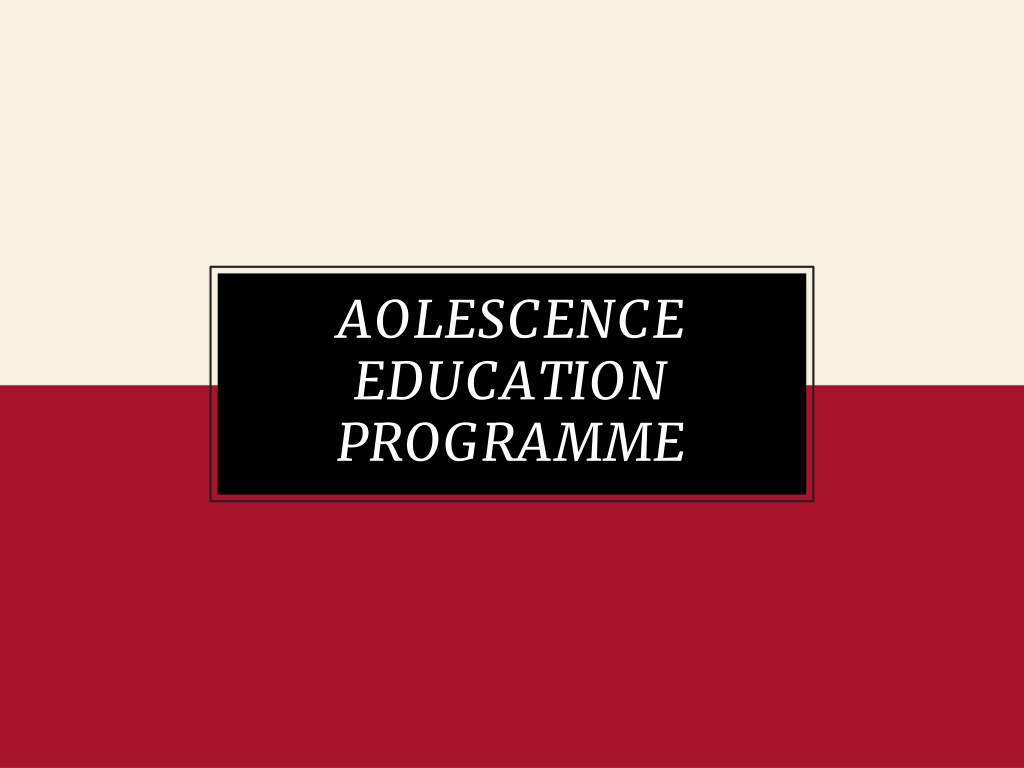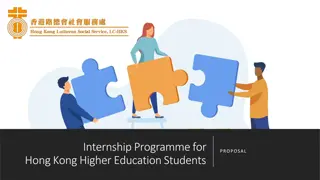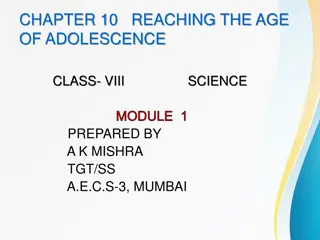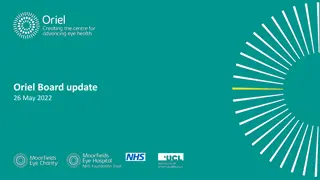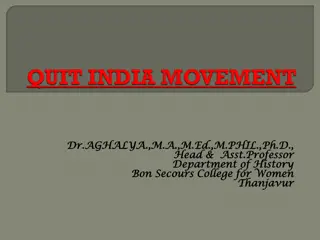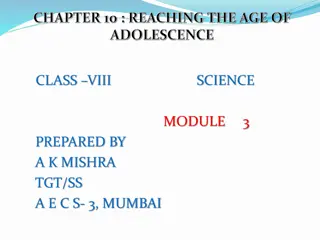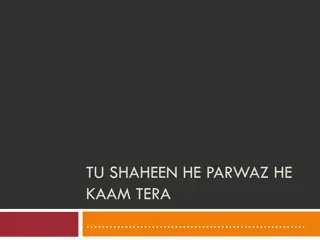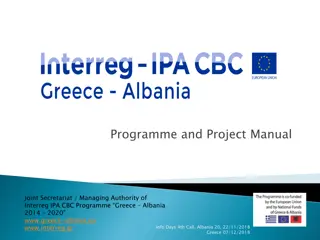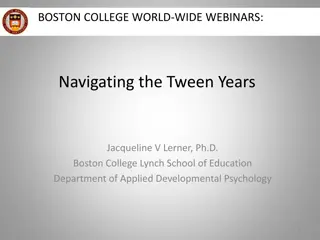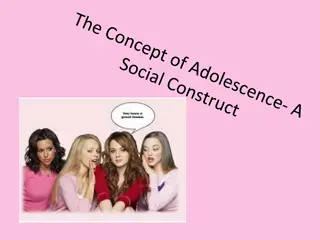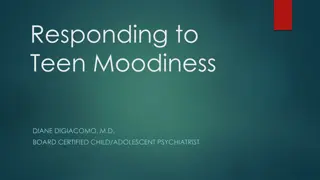Adolescence Education Programme in India
Adolescence Education Programme in India focuses on imparting comprehensive knowledge and skills to adolescents to navigate the transitional period between childhood and adulthood. The program addresses critical issues such as reproductive and sexual health, gender discrimination, and relationships, aiming to empower young individuals to make informed decisions and lead healthy lives.
Download Presentation

Please find below an Image/Link to download the presentation.
The content on the website is provided AS IS for your information and personal use only. It may not be sold, licensed, or shared on other websites without obtaining consent from the author. Download presentation by click this link. If you encounter any issues during the download, it is possible that the publisher has removed the file from their server.
E N D
Presentation Transcript
AOLESCENCE EDUCATION PROGRAMME
AGENDA Adolescence Education in India Adolescence Education Programme in India Skills of a Facilitator Advocacy Training of Peer Facilitators 2
1. Adolescence Education in India 3
Adolescent Realities Adolescence is a transition period between childhood and adulthood Physical, intellectual, and emotional characteristics & patterns of childhood are gradually replaced by adult ones Girls and boys progressively evolve into a state of relative socio-economic independence transition from socio-economic dependence to relative independence 4
Profile of Indian Adolescents 22 percent of the billion-strong population Affected by prevailing socio-economic disparities 47% of women and 16% men have never received any information on sexual matters from anybody 70% of the students who have been exposed to AEP, teachers are the main source of information 5
Profile of Indian Adolescents Only 28% of young women and 54% of young men have good knowledge about HIV/AIDS Adolescent girls continue to face gender based discrimination in most parts of India projected number of drug abusers is about 3 million (UNODC, 2003) 6
Objectives, Themes and Scope of Adolescence Education Incorporating all the critical concerns of adolescent reproductive & sexual health (ARSH) Preparing a scheme of contents suitable to provide adequate coverage to ARSH Identifying curriculum transaction strategies focused on promoting experiential learning suited to the specific needs 7
Objectives, Themes and Scope of Adolescence Education Adolescence education as an educational intervention, focusing on critical elements that would enable young people to deal effectively with issues related to: Understanding changes during adolescence and being comfortable with them Establishing and maintaining positive and responsible relationships Understanding and challenging stereotypes and discrimination related to gender and sexuality 8
Objectives, Themes and Scope of Adolescence Education Understanding and reporting abuse and violation HIV/AIDS: prevention, vulnerability, dealing with stigma, access to services, linkages with RTIs/STIs Prevention of substance abuse: causes, access to safety net, consequences, de-addiction, care and support 9
What Students Like about Adolescence Education sessions Issues like self esteem, disagreements with parents relationship with friends, attraction towards opposite sex changes during adolescence, changes in feelings and emotions Knowledge on bad habits, gender discrimination, decision making and stress management 10
What Students Like about Adolescence Education sessions When their issues were raised, discussed Enjoyed sharing their emotions and perceptions Discussion with psychologist on internal changes occurring during adolescence When their teachers shared about the problems that are prevalent in society 11
Life Skills as an Integral Part of Adolescence Education Defined as psycho-social abilities that enable individuals to translate knowledge, attitude and values Life Skills Empowers learners to observe the process involving what to do, Adolescence Education why to do, how to do and when to Life Skillls are the core of Adolescence Education do 12
Life Skills as an Integral Part of Adolescence Education Encompasses the ability :- to build sound, harmonious relationships with self, others and the environment to act responsibly solve problems survive under a variety of conditions optimize opportunities 13
Life Skills Development: Approach Framework Identify curricular as well as co-curricular activities that have the potential for developing skill application ability Role play can be very appropriate in respect of negotiation skills or interpersonal skills or skills related to empathy The education intervention may have to be designed and operationalized differently for different contexts 14
2. Adolescence Education Programme in India 15
Adolescence Education Programme Launched by Ministry of Human Resource Development, Government of India in 2005. A major part of AEP is supported by United Nations Population Fund (UNFPA), and implemented by national agencies Ultimate goal of the programme is to empower adolescent learners to acquire knowledge of their needs and concerns 16
Aims and Objectives of AEP Support development of behaviours that will empower adolescents to make healthy choices Provide opportunities for enhancement of life skills and reinforcement of positive behaviors To enable young people to grow up healthy, cope with challenges & optimize opportunities in positive and responsible ways 17
Components of the Program Life skills development focused co-curricular activities in schools Curricular integration in school curriculum, curricula and study materials of out-of-school target audiences and teacher education courses and materials 18
You can also split your content Implementing AEP Major Categories of Stratagies Programme Activities Awareness Building Material Development Integration in the School Curriculum Training Use of Participatory Advocacy Learner Centric Approaches Organisation of Activities to Promote the Objectives of Monitoring and Evaluation AE 19
Transaction Methods Question Box Role Play Situation-Analysis and Case Presentation Debate Quiz Contest Brain-Storming Studies Value Clarification Group discussion 20
3. Skills of a Facilitator 21
Facilitator A facilitator under Adolescence Education Programme (AEP) can be either of the following Master Trainer Nodal Teacher (Trained Teacher) Trained Peer Educator 22
Facilitator An individual who enables groups to interact and work more effectively a content neutral party who by not taking sides support everyone to do their best thinking and practice Encourages full participation, promotes mutual understanding and cultivates shared responsibility Search for inclusive solutions and build sustainable agreements 23
Skills of a Facilitator timekeeping, following an agreed-upon agenda, and keeping a clear record. watching the group and its individuals in light of group dynamics. variety of listening skills including ability to paraphrase, draw people out, balance participation 24
Skills of a Facilitator Knowledge and skill to be able to intervene in a way that adds to the group's creativity rather than taking away from it embodies respect for others and a watchful awareness of the many layers of reality in a human group 25
Role of Master Trainers training of nodal teachers, peer educators and other functionaries are expected to contribute to advocacy related activities for a proper appreciation of needs of adolescents and the significance of AEP Cooperation in the monitoring of the programme 26
Nodal Teachers Regular teachers selected for conducting activities under AEP in their respective schools they are the key persons responsible for effective implementation of AEP in schools are expected to contribute to advocacy related activities for a proper appreciation of needs of adolescents & the significance of AEP, particularly by the parents and community leaders 27
Peer Facilitators Peer education is an effective behaviour change strategy and peer educators role under AEP Pupils are supposed to educate and inform each other about issues and concerns Identification of students who would be trained as Peer Educators Identification of students done by respective schools 28
4. Advocacy 29
What is Advocacy? pleading for, defending or recommending an idea with a view to promoting its acceptability. include many activities that a person or organization undertakes, media campaigns, public speaking etc Lobbying is a form of advocacy where a direct approach is made to legislators on an issue which plays a significant role in modern politics 30
Skills and Qualities of a Good Advocate Is well informed about the idea or the programme or the new initiative which is to be advocated Knows the system, socio-cultural environment and also how the system works Asks a lot of questions to promote discussion on critical issues Actively listens to what others have to say Thinks about what the target audience want, and what they want to say 31
Skills and Qualities of a Good Advocate Is prepared and organized Takes action, one step at a time, to make sure that the target audience develops a shared understanding of the objectives of the program/ initiative being advocated Communicates clearly and with confidence Is assertive, but respectful and polite Identifies allies/ change agents who will help in taking the agenda forward 32
Communicating Effectively Be Respectful Asking questions/ seeking clarifications Listening Actively Dealing with Emotions Stay Focused to Your Purpose: Being Assertive 33
Proactive or reactive advocacy Sometimes advocacy work is forced on us the problem or issue is already there, and we use advocacy to reduce the problem. This is reactive advocacy. At other times it is possible to plan for the future, to set the agenda and use advocacy to create a positive environment or prevent a problem before it happens. This is proactive advocacy 34
In two or three columns Levels of advocacy National level Policy-makers at National level, National Apex Bodies of School Education (Curriculum Framing and Examination Bodies, Teacher Education Bodies), Professional Associations Local level for Principal/ Teachers of the School, Parents, Members/Opinion Leaders of the Community, Panchayat Leaders, District Level Educational Authorities. State level Policy-makers in State Governments, Curriculum Framing and Examination Bodies, Teacher Education Bodies, Teacher Educators, Professional Associations 35
5. Training of Peer Facilitators 36
Who is a Peer? Who has a near equal standing or is comparable in terms of traits and/ or characteristics under consideration The trait or characteristic could be based on social group, age, education, sex, occupation, socio-economic, health status or other factors 37
Peer Education More cost effective than other methods. Peers are a credible source of information. Peer education is empowering for those involved. Utilizes an already established means of sharing information. Information passed by peers is better accepted in the peer group 38
Peer Education Peer educators act as good role models Peer education can be used to educate those who are hard to reach through conventional methods Peers can reinforce learning through repeated sharing amongst themselves as well as through other efforts such as teacher led activities 39
Identification of Peer Facilitators Respected by peers Self confident Friendly Non judgmental Responsible Discreet Committed Tolerant Effective Role model Communicator Energetic Motivated Interested 40
Role and Functions of Peer Facilitator under AEP: Lending active support to Nodal Teachers in the organization of activities and transaction of life skills focused adolescence education in and outside classrooms Peer Facilitators have to keep abreast of new information and knowledge in respect of adolescent concerns, HIV/AIDS, substance abuse and related issues 41
Role and Functions of Peer Facilitator under AEP: Interactions with Peer Group for empowering its members: As a follow up of the sessions engaged by Nodal Teachers, having continued interaction with the peer group as per the need; Making need-based interventions for creating and sustaining an enabling environment in and outside schools Acting as role models by practicing what s/he preaches 42
Training of Peer Facilitators Undergoing intensive training to be organized for Peer Facilitators under AEP Developing complete understanding of the national framework of AEP and its adapted version in the context of local socio-cultural Sharpening their interpersonal communication skills and enriching the life skills Having comprehensive knowledge of the roles and functions of Peer Facilitators 43
Training of Peer Facilitators AGENDA To develop an understanding of the scope of AEP and rationale for peer education in the programme To enhance awareness of self to contribute towards development of a positive identity To recognize attributes of positive and responsible relationships and invest in them & inculcate leadership qualities Defining roles and responsibilities of peer facilitator 44
THANK YOU ! - Anahita Singh 45
